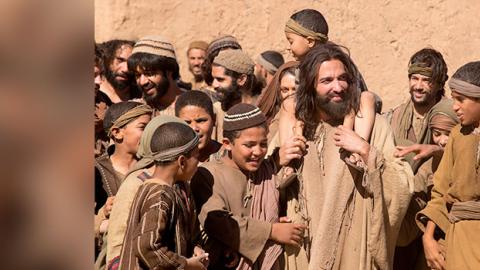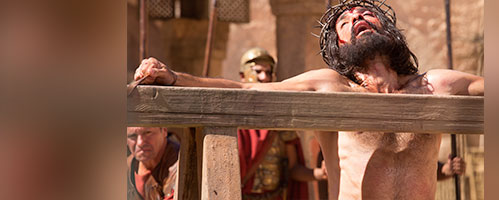
Killing Jesus' Haaz Sleiman: "Jesus Belongs to All of Us"
National Geographic's decision to cast Muslim-born actor Haaz Sleiman as Jesus in their new TV movie, Killing Jesus, caused quite a stir last year.
It's a controversy that the Lebanese-American welcomes. Even before moving to the United States at the age of 21, Sleiman had a history with Christianity. As a child, he liked everything about Christmas. Over the past 10 years, Sleiman has developed a personal affection for Jesus and his unorthodox teachings about love, grace and forgiveness.
Sleiman does not think of himself as a Christian in the traditional way, saying he's a "spiritual" man who does his best to adhere to what Jesus taught. Taking a universal approach to faith, Sleiman considers himself Jewish, Christian and Muslim, believing that all religions worship the same God (see for Jesus' remarks on the only path to God).
It doesn't bother Sleiman that some Christians have questioned him being cast as Jesus or that some Muslims are rejecting National Geographic's TV movie for its portrayal of the Son of God. His response to the controversy, "Jesus belongs to all of us".
"I want people to have conversations, to have controversy because it creates dialogue and builds bridges," says Sleiman.
Sleiman was "just grateful" to be a part of sharing Jesus' message as described in O'Reilly's book because he really loves Jesus.
"[He shared] wisdom that couldn't be disputed," says Sleiman, "like the air that we breathe."
In playing the Killing Jesus role, Sleiman says, "I only thought about one thing, which is to be as honest as possible. But what makes this easier is that how could you not fall in love with Jesus and what He stood for? It's that simple for me. It's like one of the most beautiful things that you can apply to your life. And I'm still trying to, cause it's not easy. 'Love your enemy. Judge not so that you not be judged. Forgive them, so that you be forgiven....' If you do that, it's freedom and it's the truth. For me, it is at least."

At times, the pressure of portraying Jesus' humanity and suffering got to Sleiman. He recalls feeling especially overwhelmed during the scourging scene, when a Roman soldier beats Jesus' back with a jagged whip.
"It was really draining for me. When I came back to the hotel room, I really felt depressed," he says.
Getting this historical look at biblical events right for viewers was paramount in Sleiman's mind. In fact, playing Jesus was a bit scary for him.
"What scared me the most was about not messing it up, period," he says. "'Can I do it? Can I do the whole thing? Can I really commit to just selling the story in the most honest way possible?' Because it's not an easy story to tell and it's very intense...to really understand what it means to go through that journey and to understand that journey of divinity, and then to understand the journey not only from a divinity side but from a human side. So you have divinity, humanity, both sort of merged and colliding or sort of morphing from one into another.
More importantly than anything else that I mentioned is what Jesus stood for, just really focusing on that. His essence, his message and his teachings, just everyday gave me the power and the reason because then I have that reason. I have this huge desire to really tell a story because I really have so much love and passion for him, and admiration and respect. I just wanted to do everything I can to tell the story. That was very important to me."
Jesus' message of love and forgiveness is what stirs Sleiman most. During a difficult time in his life, the actor clung to Jesus' words.
"One of the most powerful things about when He says, 'Love your neighbor as you love yourself.' Just that statement is incredible, because it is one simple thing, idea that is as vast as the universe, limitless, has no limit whatsoever and it's so inclusive of everyone," he says. "That to me on its own, that concept probably was the most transformative concept for me regarding having him affect me and influence my life, because it changed how I treated myself and it changed how I treated others. As a result, it just made me more open and less judgmental, and really a happier person.
But really the ultimate thing, and it always is going to go back to it, nothing goes on top of that one word, which is love. That is really His embodiment, that light, that love that He had at the time that still shines through till now, after all these centuries. That's incredible. I mean, the power of love, there's nothing more powerful than that. So for me to also go through this experience and play this part, walking out of it, one thing sticks out the most, which is to live in love everyday, to really practice living in love everyday."

Reflecting on the humiliation Jesus experienced at the hands of his enemies, Sleiman drew connections to his own life.
"I remember the scene where they put the crown of thorns on and how everybody was mocking him and making fun of him," he says. "It really felt dark and isolated, and alone, and a place that I have been in, in my life. I'm sure most people in this world felt either in a dark place or isolated, or alone at some point.
But I think what was magnificent about this story and him, and how he handled it was that he really saw the bigger picture and the truth of things. He was not caught up in the games that were being played. He didn't judge the games because he didn't judge humanity. He actually saw beauty in all of it. He saw even beauty in the chaos.
He had only love for the people, even if they were the ones who were acting out of ignorance or because they couldn't see.... Jesus saw the truth. He was in that place of knowing the truth. He also came from a place of love and not judgment, even with those who came at him and treated him badly."
In studying to play the part of Jesus as humanly as possible, Sleiman also developed some insightful thoughts about the personality of the Son of Man.
"He has a very incredible ability to be present and really, really just see people," Sleiman says. "He's very sensitive. He has the ability to feel people energetically. He was a healer. He was a teacher. He was somebody who inspired people, so he was charismatic. People liked him. People liked to be around him. He knew how to talk to people. He in no way made them feel uncomfortable. He was always at their level, being able to talk to fishers and then to tax collectors, I mean, all kinds of walks of life, to homeless people.
The reason why He was able to do all of that is because He had really just unconditional love for everyone, and love for them meant that He wanted to talk to them. He wanted to interact with them. He wanted to have an experience and feel connected.... He really cared.... It was like an amazing, charismatic quality that was just very engaging, inviting and inclusive, and very warm, but also playful."
By the end of filming, Sleiman hoped for one thing--to "get even closer to living by what [Jesus] stood for". It's an admirable goal, one he admits he's still working on.

As believers, we know that Christ was more than a prophet, a wise teacher and a gifted healer. He is Redemption. Sleiman may not follow all of the tenets of faith that Christians do, but he is right about Jesus' unconditional love being for us all. Jesus had love for the Jews who wept at his beating. He had love for their neighbors who cried for his crucifixion. He had love for the Romans who oppressed his people ( ). He had love for the adulterer ( ). He had love for the outcast ( ).
God's love knows no end. He has love for the Muslim. He has love for the Jew who doesn't yet accept him as Messiah. Jesus has love for those who deny his Father's very existence. Jesus does belong to all of us because he died for every one of us ( ).




